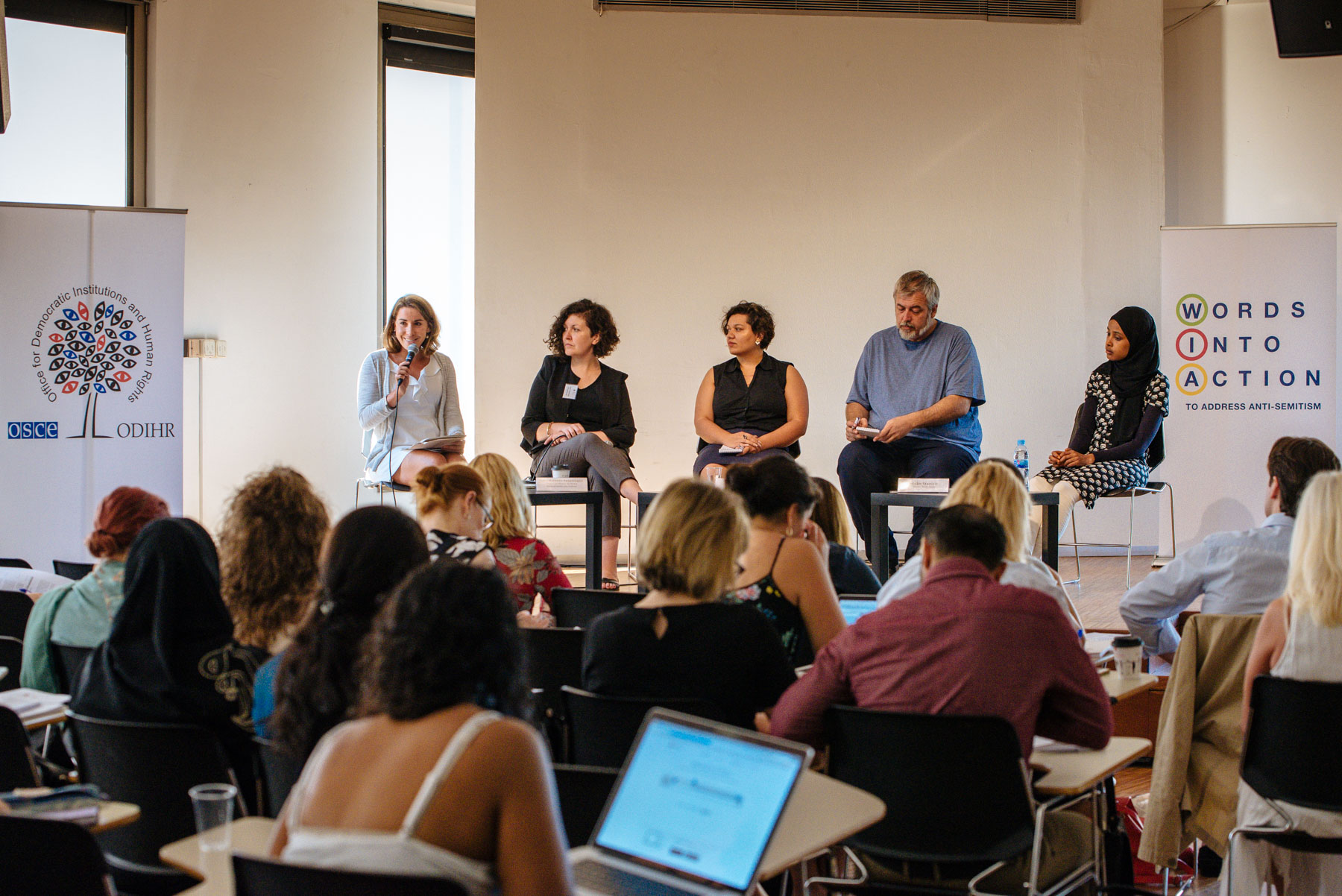By Dr. Mischa Thompson,
Policy Advisor
“[There were so many victims of the Holocaust] but we engage in competitive victimhood, where we take the oppressor’s view of a victim’s worth.”
– Words into Action participant Misko Stanisic, Terraforming
From June 21 to June 23, 2017, the Organization for Security and Cooperation in Europe Office for Democratic Institutions and Human Rights (OSCE/ODIHR) hosted the second in a series of workshops focused on addressing anti-Semitism.
The workshop, titled “Gender and Intersectional Activism: Coalition-Building for a More Tolerant Society,” provided a forum for 50 civil society leaders to discuss their efforts to address prejudice and discrimination across the 57 European and North American countries of the OSCE. The forum was part of the OSCE/ODIHR’s “Turning Words into Action to Address Anti-Semitism” (WiA) project, which increases the capacity of countries and civil society to prevent and respond to anti-Semitism through security, education, and coalition-building measures. According to Cristina Finch, Head of the ODIHR Tolerance and Discrimination Department, the forum will also assist with “creation of a coalition-building manual that ODIHR will publish to assist civil society in these efforts.”
Noting the problem of “underreporting,” the forum  educated participants about OSCE/ODIHR efforts to collect hate crimes statistics, and highlighted methods by which civil society could work with local law enforcement and the OSCE/ODIHR to report hate crimes.
educated participants about OSCE/ODIHR efforts to collect hate crimes statistics, and highlighted methods by which civil society could work with local law enforcement and the OSCE/ODIHR to report hate crimes.
At the forum, OSCE/ODIHR shared recent findings that indicate that while Jewish men are more likely to be victims of anti-Semitic speech or physical violence, Jewish women fear anti-Semitic attacks more. This suggests gender may play an important role in addressing anti-Semitism, prompting the need for more gender-rich and intersectional prevention efforts.
For instance, Misko Stanisic of Terraforming, an organization focused on Holocaust and human rights education, noted that thousands of women participated in crimes of the Holocaust, but that gender stereotypes resulted in women often not being viewed as perpetrators, resulting in “female perpetrators [being] seldom investigated for their crimes and rarely prosecuted during the post-war trials.”
He also described how socially constructed perceptions of gender, race, and other identities not only impacted who is – and who is not – included in text books and other educational tools on the Holocaust, but also how this has impacted efforts to address anti-Semitism. “[There were so many victims of the Holocaust] but we engage in competitive victimhood, where we take the oppressor’s view of a victim’s worth,” he said.
Other participants highlighted the forum’s relevance to American scholar Kimberle Crenshaw’s intersectionality theory, which details how hierarchal systems of gender and race resulted in African-American women often being excluded from the mainstream feminist movement in the United States. In particular, participants discussed how efforts to address anti-Semitism and other forms of prejudice and discrimination have been stymied by approaches that have reinforced gender and other hierarchical power structures preventing men and women within communities from effectively working together.
Invoking American luminary James Baldwin, Finnish journalist Maryan Abdulkarim stated, “No one is free until we are all free.” She stressed the need for more inclusive efforts that move away from a focus on differences that separate the “majority” and “minorities,” and to restore humanity by challenging harmful societal constructs and working across communities, including with the “majority” to address problems.
While the forum explored the importance of inclusive approaches to addressing anti-Semitism and other forms of intolerance, some participants warned that intersectionality could become an ineffective trend if care is not taken in its implementation. Specifically, the differences between academic discussions and practice were raised. In particular, participants cited the need for clear laws, processes, and procedures that protect all, as well as equal access to justice. For example, laws and policies should be understandable to police, judges, and ordinary citizens, and straightforward to implement. Researchers, funders, and advocates should be particularly mindful as to whether their efforts advance equality, or simply check a box.
The art and commentary of speaker Dan Perjovschi underscored and offered insight into the societal challenges forum participants faced in efforts to address anti-Semitism, gender and other inequities in countering prejudice and discrimination at large, and the need for their continued efforts.





